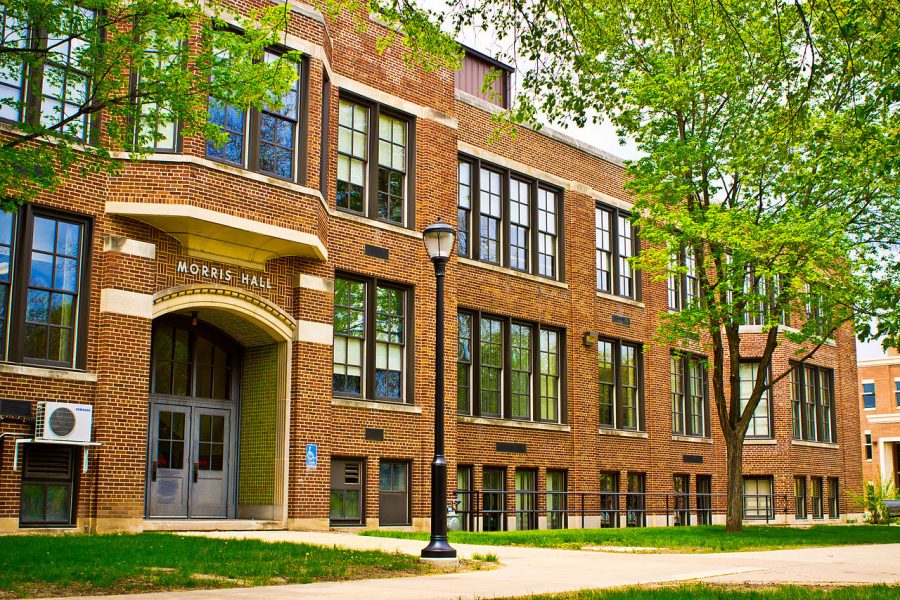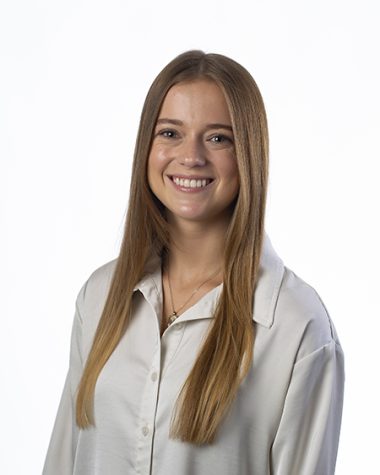Students voice concerns during Broadfield Social Studies Advising meeting
March 28, 2022
On Thursday, March 24, the School of Education (SOE) held an advising meeting for the University of Wisconsin-La Crosse broadfield social studies (BFSS) students in the Hall of Nations from 5:00 p.m. to 6:00 p.m. This meeting comes following numerous complaints about the handling of the program timeline.
Around 30 students came to hear from a wide range of faculty members associated with the SOE, including the SOE Dean Marcie Wycoff-Horn, Interim Associate Dean Adrienne Loh, and College of Arts, Social Sciences, and Humanities (CASSH) Dean Karl Kunkel. SOE Dean Wycoff-Horn started the meeting with faculty introductions and information regarding the UWL BFSS program.
UWL students have been expressing concerns for the past few months regarding graduation timelines, financial concerns, and field experience openings. Dean Wycoff-Horn said, “we have heard student concerns and requests for more transparency and communication surrounding broadfield social studies.”
Dean Wycoff-Horn went through a PowerPoint slide covering various topics such as student teaching capacity and placement locations, transportation options for field experience, and alternative options for the SOE students.
“Broadfield social studies education is a competitive admission program with limited capacity,” said Dean Wycoff-Horn, “like other limited capacity programs, they may not be able to serve all interested students.” Due to this, the Dean and the SOE faculty have provided a list of backup options for students that can’t get into their field experience during the semester they had planned out in their school of education planner that students build with their advisors.
“You should have seen a semester-by-semester planner if you’ve been working with an advisor that lays out all your requirements all the way to graduation,” said Dean Wycoff-Horn. SOE students use this planner to ensure they can graduate on time and that they’re staying on track with their graduation benchmarks, however, students have expressed concerns that they have now had to create “option b” planners due to limited placement capacities.
These backup options included studying abroad for a semester and reapplying for admission, adding an emphasis or minor and reapplying for admission, choosing a different teacher education major, or choosing a different content major to prepare for other related careers.
“I have recently been talking to principles in the area and sharing with them this issue that we’re having, and I’ve been asking them what they would tell these students,” said Dean Wycoff-Horn, “and they told me, ‘I would tell them to get another content major because we want to hire people that have flexibility. I would tell them to think about special education, things like that to make yourself more marketable.’”
According to 2021 new student data from the UWL admissions office, education as a major is ranked in the top five most popular incoming first-year undergraduate majors.
Dean Wycoff-Horn then opened it up for questions for students that have concerns regarding their current situations. “Without the feedback, we don’t know what you need or what is happening, so we can’t make changes if we don’t know,” said Dean Wycoff-Horn.
“I am confused as to why field and student teaching is advertised as a hiring process when it’s a graduation requirement?” said one student. Dean Wycoff-Horn said, “Every internship is a job interview, whether you like that idea or not, it’s the reality of the situation.”
“If you don’t get into the program, your suggestions are to add a minor, switch your major, go study abroad, transfer, or do anything besides what your actual goal of education is. Every single one of those options either puts additional time on or costs extra money, so it feels very unfair to us,” said another student.
“I pay for school myself and it feels very unfair for me to have to spend extra money on a degree that I don’t necessarily want when this is my passion. I don’t understand how that is a fix. You’re asking us to change our goals and to do something else we don’t want to do because your school can’t find room for us or expand the program.”
“There are teachers who want us, but they’re not being contacted to host placements. It feels like to us that you aren’t trying because you want us to change what we want to do instead of expanding our program, it feels like you don’t care about this program or us,” said one student.
Dean Wycoff-Horn said, “We have talked with many administrators, I’ve been working with them, we are looking at capacity and what that looks like. It’s not fair to tell you you’re going to be able to progress in a program either when we can’t say for sure we have the placements.”
“We can admit you, but you may not have a placement. So, you’re still in no better shape than if we say at least have some options in front of you if this happens,” said Dean Wycoff-Horn.
“Are you doing that freshman year or are you doing that when they’re applying their junior year?” asked the same student. “No, we will be telling admissions, telling campus close up, and communicating this frequently and often, including on the website,” said Dean Wycoff-Horn.
“What fell through the cracks this semester? Why did I and a couple of other people have their field placements deferred? You said so yourself, that adds a semester to my plan. I didn’t know and my advisor didn’t know until the first day of classes. How did that happen?” said another student.
“We could see the numbers were coming, there were going to be way more than we anticipated. We had the conversations about how to communicate this to students, we thought this was going to be serving as a reminder, but it was the first time people had heard about it, so again, apologies about that,” said Dean Wycoff-Horn.
The Interim Associate Dean Loh said, “the intent was to support students at the time who were excited and eager to pursue their program, and I think we didn’t collectively realize how that was going to play out for some students.”
One student said, “I am confused that if you had a meeting discussing that half of us that applied weren’t going to start until the fall, why didn’t you send an email to us to clarify that? It is a whole semester added to my plan.”
Another student followed up regarding the language used in an email sent out to students on this issue, “the email says ‘this is to inform you’ so the language in the email is all approaching as whoever sent the email knew we were just learning about this. There is nothing in the email that hints at we have already known this. I feel like you’re dodging the repercussions there.”
“My office sent that, we thought you knew,” said Dean Wycoff-Horn. One student said, “It does feel like you all should take some responsibility for that miscommunication.”
“It’s really unfortunate, I think we’re all very sorry this happened, and we’re trying to do our best now to support you in coming up with plans that work for you,” said Interim Associate Dean Loh.
“What’s going to happen to the next wave of students, will there be a backlog?” said one student.
“The list right now is quite long, the faculty are going to be determining what admission criteria are, and those students are going to need to think about a plan b,” said Interim Associate Dean Loh.
“This big mistake happened, the program is already almost four and a half years long, and now because of this, I might be doing five and a half years for undergrad. I don’t have the money to add another minor, to transfer, or to study abroad, so my options are either the school pays for it or I drop out,” said one student.
Another student said, “A lot of the message seems to be individualizing the problem for us, but there needs to be something on the administration to come up with, alternate routes, to still allow students to graduate within four years like this program is supposed to be, other than studying abroad. What alternate routes are you considering rather than making recommendations that add on time and financial burdens?”
Dean Wycoff-Horn said, “What are you thinking?” The student said, “this is not my job, this is your job.”
“It was mentioned earlier that you noticed more admissions into broadfield social studies, if you noticed these increased admissions, why was there nothing planned out for this issue?” said another student.
Interim Associate Dean Loh said, “the increase in social studies demand has been pretty recent, it seems like there was a pretty high rise right now.”
One of the final questions from a student said, “What can you do for the people in this room that are already late in the game. We have started the discussion about our issues because we want things fixed, and you’re going to inform prospective students, but that doesn’t help anyone in the room who can’t change their major or add a financial burden, what can you do for us?”
“I hear your points. We are talking with principles about capacity, if we’re able to put a few more students, we will, but that has to trickle through the whole system, there has to be a plan. We want to make sure you’re not stuck someplace,” said Interim Associate Dean Loh.
A final statement by one student said, “I think that if other schools in the UW systems are able to get their secondary education students through in four years that can get jobs because they have plenty of experience, then I think UWL should be able to do it too.”
In a follow-up statement with The Racquet Press and with Dean Wycoff-Horn and Interim Associate Dean Loh, Dean Wycoff-Horn said, “It’s a difficult situation, we’re working through possible solutions, it’s not as simple as us figuring it out or a student figuring it out, we’re having to work with partners that require everyone to be available and on board to make the experience possible and a good experience for students as they prepare for their future careers. We are not taking this lightly.”
Interim Associate Dean Loh said, “We understand and empathize with what the students are going through and it’s important to realize that we all have the same end goal in mind which is to prepare the best future teachers, and we’re not against students, we’re trying to support students in being well prepared for the job that they’re going to do and we have a moral and ethical responsibility to provide quality programming.”
CASSH Dean Kunkel said, “We had this meeting to give students the opportunity to hear from administrators and to ask questions, and that’s what happened.







